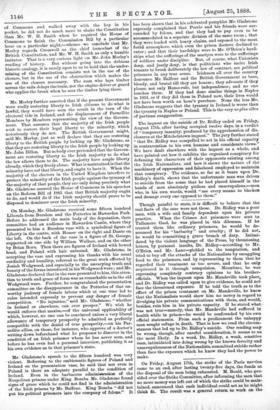Though painful to state, it is difficult to believe that
the real facts of the case were not these. Dr. Ridley was a poor man, with a wife and family dependent upon his private practice. When the Crimes Act prisoners were sent to Tullamore Gaol, he was placed in this dilemma. If he treated them like ordianry prisoners, he would be de- nounced for his " barbarity " and cruelty; if he did not, he would be committing a grave breach of duty. Intimi- dated by the violent language of the Press, by threatening letters, by personal insults, Dr. Ridley—according to Mr. O'Brien and Mr. Lane—yielded to the temptation, and tried to buy off the attacks of the Nationalists by smuggling food to the prisoners, and by representing to them that he regarded their treatment as too severe, and that he only acquiesced in it through compulsion. Meantime, he was expressing completely contrary opinions to his brother- officials. When the inquest upon Mr. Mandeville took place, and Dr. Ridley was called upon to give evidence, he could not face the threatened exposure. If he told the truth as to the effect of the prison treatment on Mr. Mandeville, he knew. that the Nationalists would show him no mercy in regard to divulging his private communications with them, and would, besides, ruin him in. his private capacity. If he stated what. was not true—namely, that Mr. Mandeville had suffered in health while in prison—he would be confounded by his own official statements. From such a predicament the unhappy man sought refuge in death. That is how we read the circum- stances that led up to Dr. Ridley's suicide. Our reading may be wrong, though, after careful consideration, it seems to us the most likely. In a word, Dr. Ridley, a weak, sensitive man, intimidated into doing wrong by the known ferocity and unscrupulousness of the Nationalists, committed suicide rather than face the exposure which he knew they had the power to make.


































 Previous page
Previous page